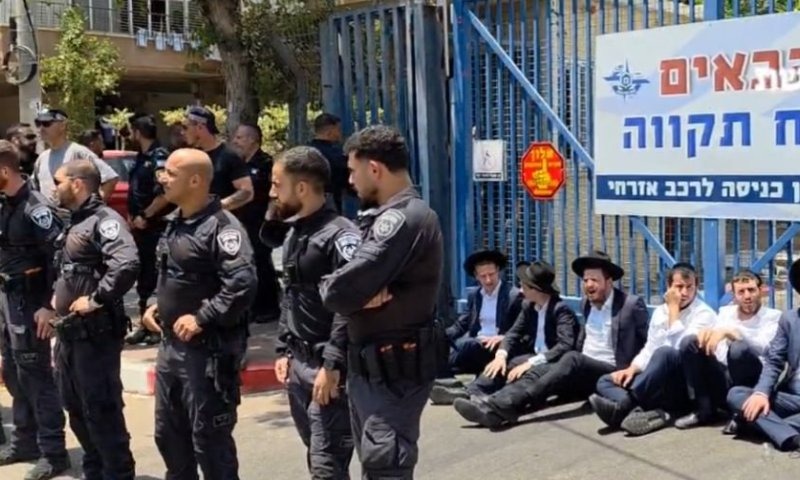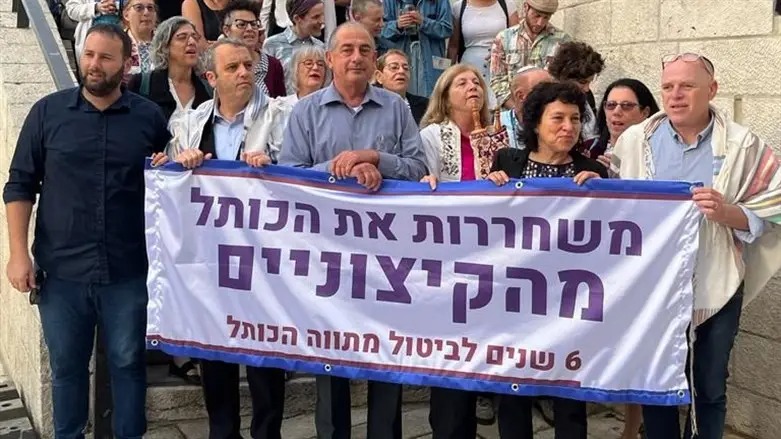A yeshivah bochur went to the Petach Tikvah police station early Tuesday afternoon to request a “certificate of good conduct” [תעודת יושר] and was arrested on the spot as an army deserter.
A “certificate of good conduct” attests to a person’s lack of a criminal record, which is required to apply to certain official bodies or jobs.
When the bochur, a talmid at the Sephardi Minchat Yehuda yeshivah, arrived at the station, the investigator who checked his details discovered that he was subject to conscription—and he was transferred to the military police.
Shortly afterward, Peleg Yerushalmi called for demonstrations near the police station, and dozens heeded the call, leading to clashes between the police and the protesters.
Rav Doron Gedalia, the Rosh Yeshivah of Michat Yehudah, said in an interview with Kol B’Ramah, “Bochurim were instructed to be careful and not approach police officers. This is an extreme war against Hashem and lomdei Torah. Arrest is a red line; everything must be done to stop it.”
(YWN Israel Desk—Jerusalem)












11 Responses
“Everything must be done to stop it” means everything except enlisting. The panic has arrived.
How is this not Bitul Torah?
Who gave them the Heter to make this Chilul Hashem?
Where in Torah does it say that you only need to learn and nothing else?
!לא המדרש עיקר, אלא המעשה
!גדול הלימוד המביא לידי מעשה
Where in the history of עם ישראל do we see that the husband sits and learns while the wife goes to work and the Yoch of taking care of the home? I am asking because I simply don’t know, please help me source this new type of Yiddishkeit.
Each and everyone of these protesters should be arrested and put into military uniforms immediately. But I fear most of them are Americans having a good time. If so put them on planes home to mommy and daddy
I am very bothered at the way this makes us look.
There are hundreds of thousands of Yidden that are on the front lines guarding the borders to Eretz Yisroel while these good for nothings sit and waste precious resources with their חילול השם
it’s not a new kind of yiddishkeit
try the gemoro in kesuvos somewhere (around the 60s) where talmidim would ask their wives for permission to go off to yeshiva for any number of years – which is actually how Rabbi Akiva became Rabbi Akiva
as to your first question, the concept of “hafgana” is mentioned explicitly in taanis 18a. Granted the gemoro means tefilla as well, but you do see there that they petitioned the ruling party as well. At that time it was also a gezera against the Torah
Beis Dovid, you are correct. Both reform and Hareididom are reactions to modernity. One embraces it too completely. One rejects it too completely.
i hope everyone will finally admit:
these are NOT out brothers
these are NOT our friends
Beis Dovid,
First, to clarify: Limud Torah is not just another occupation; it is considered the foundation of Klal Yisrael’s spiritual existence. Chazal teach us that Talmud Torah keneged kulam—Torah learning is equal to all other mitzvos because it sustains the world. In times of spiritual or physical threat, the merit of Torah study is our strongest defense.
Regarding bitul Torah and public protest: this is not a matter of individual choice but a communal response to a threat to the very ability to continue Torah learning freely. When Torah learners are arrested for being who they are—lomdei Torah—the community must act. This is not a parade or a political event; it’s a protest rooted in mesirus nefesh to preserve Klal Yisrael’s core mission.
As for the idea that men learn while women support the home: this is not a new “type of Yiddishkeit.” We see echoes of this even in the Gemara (Sotah 21a), where it speaks of the reward women receive for enabling Torah learning. In more recent history, post-Holocaust Gedolim like the Chazon Ish and the Steipler strongly supported the Kollel model to rebuild Torah in Eretz Yisrael.
Certainly, this path isn’t for everyone. But for those who commit their lives to Torah, it is done with full awareness and often with great personal sacrifice—not laziness or escapism.
Lastly, לא המדרש עיקר אלא המעשה doesn’t mean Torah isn’t primary—it means Torah must lead to action. And what greater action is there than preserving Torah itself?
May we be zocheh to see the Torah respected by all, and to continue its transmission without fear.
It’s very very sad how many of our brothers truly have zero value for the learning and following of our own religion. Wake up wake up who exactly do you think the Redemption is coming for? Do you really think the people that spoke out against rabbis and trash their holy opinions are going to greet the mashiach? Are you that stupid? It’s time to get on their side or get out. I’m speaking with your best interests at heart
To Yaakov from Yerushalayim,
You wrote eloquently, but respectfully, I believe you’ve blurred the boundaries between Torah values and recent sociological constructs that have little precedent in Chazal.
“Talmud Torah keneged kulam…”
Absolutely. But that Chazal is not a carte blanche heter for bitul ma’aseh or to ignore the broader Torah obligations incumbent on a man, including supporting his family and engaging in honest work where appropriate.
The same Chazal that praises Talmud Torah also says (Brachos 35b), “Many did like R’ Shimon bar Yochai and were not successful.” Why? Because not everyone is cut out to sit and learn indefinitely. The Gemara there clearly encourages a balance between Torah and work, not Torah while outsourcing one’s responsibilities to his wife and in-laws.
“When Torah learners are arrested… the community must act…”
Let’s be honest. Torah is not under existential threat here. What is being asked is to register like every other citizen, something done in civilized countries. Protesting in the streets and causing massive chillul Hashem—blocking ambulances, screaming at soldiers, inconveniencing thousands of fellow Yidden—is not mesirus nefesh. It’s a perversion of Torah values, and no amount of lomdus will justify turning Torah into a wedge issue.
“Women receive reward for enabling Torah learning…”
Yes—but that’s when a husband is a true talmid chochom, not when he decides to permanently shirk responsibility under the illusion that he is “holding up the world.” The Rambam (Hilchos Talmud Torah 3:10) is explicit: one who learns Torah and expects to be supported by others has desecrated the Name of Hashem, and extinguished the light of Torah. אין דבר ברור מזה.
“Chazon Ish and Steipler supported the Kollel model…”
True—but as a bedieved, post-Holocaust emergency measure, to rebuild Torah. It was never meant to become the standard for an entire nation indefinitely. Even Rav Aharon Kotler, who strongly supported full-time learning, never suggested that every man is exempt from the obligation of parnassah and building a household with proper halachic balance.
“This path isn’t for everyone…”
And yet, the system you defend demands that everyone conform to this lifestyle, even those not suited for it—resulting in spiritual burnout, financial dysfunction, and the unfortunate collapse of normal Jewish family structures, where the husband no longer bears the yoke of parnassah, which the kesubah explicitly obligates him to carry.
“What greater action is there than preserving Torah itself?”
But Torah is not preserved through shouting in the streets or through dependency on government stipends. Torah is preserved through emunah, humility, responsibility, and Kiddush Hashem, not Chillul Hashem. The Sifrei (Devarim 11) says, “Ve’ahavta es Hashem… she’yihei shem Shamayim misahev al yadecha”—you’re supposed to cause others to love Torah Jews, not loathe them.
So let’s not confuse learning Torah, which is our lifeblood, with a political movement that has attached itself to Torah externally but has little to do with the Torah’s internal values.
No one is against Torah. But many are against its misuse. And against turning
מהפך של ביתו לפרנסתו
(גמרא ברכות דף ח עמוד א)
into some “mesorah” when in truth, it’s the biggest distortion of the Jewish home Chazal ever envisioned.
IMHO, if you learn any Torah of the Lubavitcher Rebbe זצ”ל, you will discover a whole world that you never saw before…. you will see how all of Torah is connected, both נגלה and נסתר and you will realize that when we walk the streets anywhere in the world, we represent הקב”ה and its our obligation to make a Kidush Hashem and not ח”ו להיפך